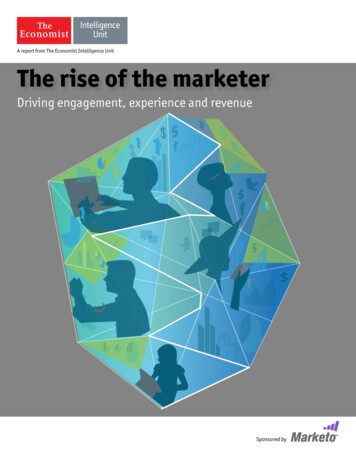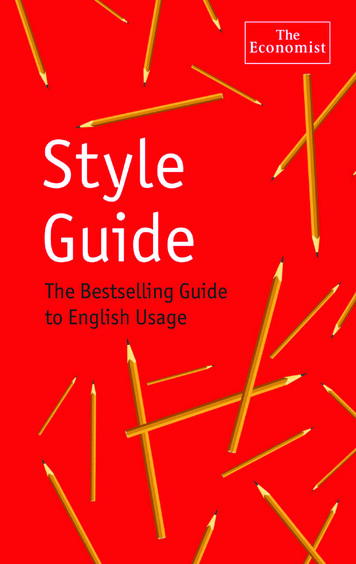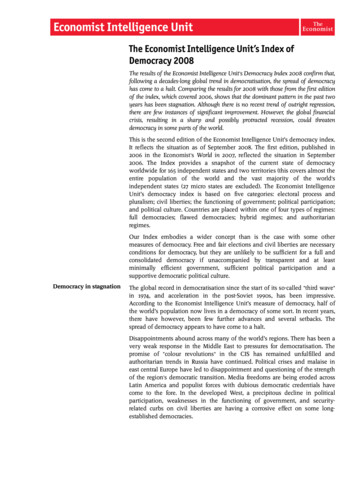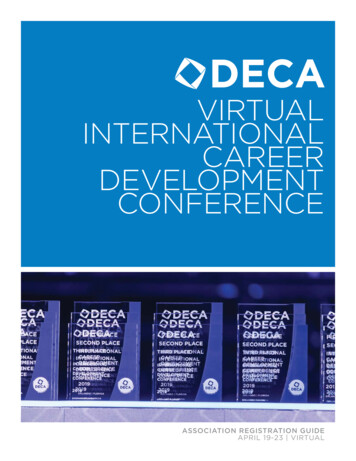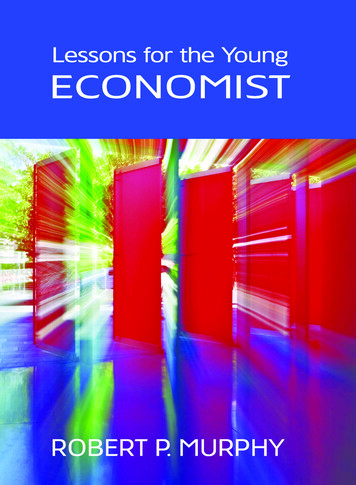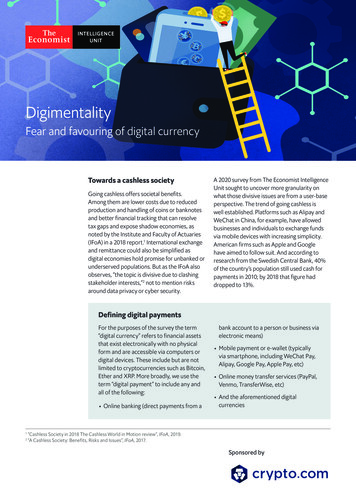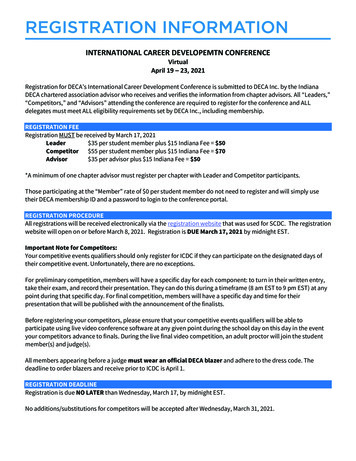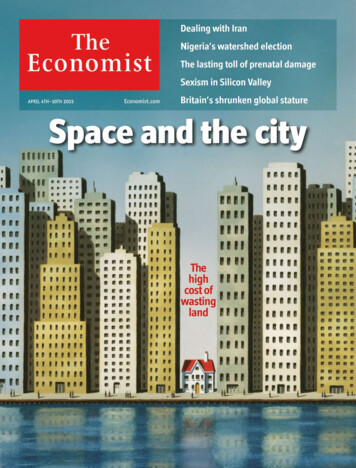
Transcription
“First Republic knows how to work with familyowned businesses. Tey remove all of the stressorsso I can focus on my business.”E A R L “ B U T C H ” G R AV E S , J R .President and CEOBlack Enterprise(855) 886-4824 or visit www.frstrepublic.com New York Stock Exchange Symbol: FRCMember FDIC and Equal Housing Lender
The Economist April 4th 2015 5Contents8 The world this weekOn the coverThe huge cost of poor landuse in the world’s greatestcities, and what to do aboutit: leader, page 11. Land, thecentre of the pre-industrialeconomy, has returned as aconstraint on growth, pages21-23The Economist onlineDaily analysis and opinion tosupplement the print edition, plusaudio and video, and a daily chartEconomist.comE-mail: newsletters andmobile editionEconomist.com/emailPrint edition: available online by7pm London time each ThursdayEconomist.com/printAudio edition: available onlineto download each FridayEconomist.com/audioeditionVolume 415 Number 8932Published since September 1843to take part in "a severe contest betweenintelligence, which presses forward, andan unworthy, timid ignorance obstructingour progress."Editorial offices in London and also:Atlanta, Beijing, Berlin, Brussels, Cairo,Chicago, Hong Kong, Johannesburg, Lima,Los Angeles, Mexico City, Moscow, New Delhi,New York, Paris, San Francisco, São Paulo,Singapore, Tokyo, Washington DCLeaders11 Urban landSpace and the city12 Nigeria’s electionThree cheers fordemocracy12 Prenatal careGreat expectations13 British foreign policyPunch and duty14 Special economic zonesNot so specialLetters16 On Latin America, Russia,Japan, deep learning,companies, the budgetBriefing21 Land-shackled economiesThe paradox of soilUnited States25 The ConfederacyThe present past26 The South’s economyThey wish they were inDixie29 Delaware’s economyFalling in the First29 Dating appsLess choice, please30 Indiana politicsReligious freedom v gayrights30 Harry ReidThe slugger of the Senateretires31 LexingtonWhy the gun lobby iswinning32333334The AmericasVenezuelaMaduro’s muzzleBullfightingMatadors on the marchPeru’s governmentThe fall of Ana JaraBelloThe neglected art ofbiographyAsia35 Malaysian politicsRiding a tiger36 Ethnic minorities inVietnamOut of sight37 Elections in Central AsiaNo choice38 Japan’s working poorStruggling39 BanyanAsia’s retiring strongmenChina40 Poverty in ChinaJust a little bit richer41 The internetGreat walls of fire41 Stolen artefactsRelics of plunderMiddle East and Africa42 Nigeria’s electionHail to the voters43 The Iran talksGoing to the wire44 Saudi ArabiaDecisive or rash?44 YemenThe old man who lingers45 Syria’s civil warAssad on the back foot46 Politics in SomaliaLoth to admit failure46 South African historyHit the Rhodes, CecilEurope47 Germany’s logjamAn uncomfortablearrangement48 Minorities in FranceAn edgy inquiry48 Spanish politicsThe old and the new49 Russia’s recent pastNemtsov Bridge50 An angry Dutch moodA low-spirited country52 CharlemagneEuropeans’ privacy fearsDealing with Iran What isneeded for a nuclearsettlement, page 43. Theimpact on Iran’s oil industry,page 62Nigeria Muhammadu Buhariwins a watershed election.May he rise to his task: leader,page 12. The ousting of anincumbent president marks ahopeful step for democracy,page 42. Nigeria’s strugglingeconomy, page 71Little Britain A shrinkingplayer on the global stage:leader, page 13. When allieslook at Britain, they see—andlament—a country that isturning inward, page 53. Inthe longer term, Britain’sdiscomfort with the EU mayturn out to be a bigger riskthan Greece’s exit from theeuro, page 781 Contents continues overleaf
6 ContentsThe Economist April 4th 2015Britain53 Projecting powerLittle Britain55 Hague departsWilliam, it was reallynothing56 BagehotScaring voters, notimpressing themPrenatal healthWhy policymakers should paymore attention to pregnantwomen: leader, page 12. Achild’s long-term well-being ismore profoundly shaped byinfluences in utero than usedto be realised, page 57. Someexpectant mothers struggle toquit smoking. What can help?Page 58Microsoft at 40 The oncedominant software giant triesto reinvent itself, page 59.Mexico’s nascent tech hub,page 61Sexism in Silicon Valley Techfirms can banish sexismwithout sacrificing the culturethat made them successful:Schumpeter, page 64International57 Prenatal health and lifeUnequal beginnings58 Smoking in pregnancyHuffing and puffingBusiness59 Microsoft at middle ageOpening Windows61 Steel in ChinaTwin peaks61 Startups in MexicoTechs-Mex62 Iran’s oilRusty taps63 Tyremaking in IndiaApollo’s mission64 SchumpeterValley of the dudesFinance and economics65 Special economic zonesPolitical priority,economic gamble66 ButtonwoodJitters on Wall Street67 Investing in artA study in red and black67 German propertyBraking bad68 Corruption in BrazilTaxmen on the take71 Nigeria’s economyTo the victor the toils71 Greece and its creditorsStarting to list72 Free exchangeMaking meetings workScience and technology73 Exploration (1)Wiring the world below74 Exploration (2)The worlds beyond75 Powering space travelNASA’s dark materials76 Emergency medicineSomeone to hold yourhand76 An ancient motherCretaceous insects7778787980Books and artsBecoming Steve JobsJobs 2.0Britain and the EUThe Brexit dilemmaFlash fictionSuper-short short storiesLife and friendshipTime it wasCollecting personal dataUses and abuses84 Economic and financialindicatorsStastistics on 42economies, plus a closerlook at crowdfundingObituary86 Sashimani DeviA marriage made inheavenHow to make meetings workCommittees are full of biases.New research hints at ways ofmaking meetings moreeffective: Free exchange,page 72Subscription serviceFor our latest subscription offers, visitEconomist.com/offersFor subscription service, please contact bytelephone, fax, web or mail at the detailsprovided below:Telephone: 1 800 456 6086 (from outsidethe US and Canada, 1 636 449 5702)Facsimile: 1 866 856 8075 (from outsidethe US and Canada, 1 636 449 omist.comPost:The Economist SubscriptionServices, P.O. Box 46978,St. Louis, MO 63146-6978, USASubscription for 1 year (51 issues)United StatesCanadaLatin AmericaUS 160CN 165US 338Principal commercial offices:25 St James’s Street, London sw1a 1hgTel: 020 7830 7000Rue de l’Athénée 321206 Geneva, SwitzerlandTel: 41 22 566 2470750 3rd Avenue, 5th Floor, New York, NY 10017Tel: 1 212 541 050060/F Central Plaza18 Harbour Road, Wanchai, Hong KongTel: 852 2585 3888Other commercial offices:Chicago, Dubai, Frankfurt, Los Angeles,Paris, San Francisco and SingaporePEFC certifiedPEFC/29-31-58This copy of The Economistis printed on paper sourcedfrom sustainably managedforests certified to PEFCwww.pefc.org 2015 The Economist Newspaper Limited. All rights reserved. Neither this publication nor any part of it may be reproduced, stored in a retrieval system, or transmitted in any form or by any means, electronic, mechanical, photocopying, recording orotherwise, without the prior permission of The Economist Newspaper Limited. The Economist (ISSN 0013-0613) is published every week, except for a year-end double issue, by The Economist Newspaper Limited, 750 3rd Avenue, 5th Floor, New York, N Y 10017.The Economist is a registered trademark of The Economist Newspaper Limited. Periodicals postage paid at New York, NY and additional mailing offices. Postmaster: Send address changes to The Economist, P.O. Box 46978, St. Louis , MO. 63146-6978, USA.Canada Post publications mail (Canadian distribution) sales agreement no. 40012331. Return undeliverable Canadian addresses to The Economist, PO Box 7258 STN A, Toronto, ON M5W 1X9. GST R123236267. Printed by Quad/Graphics, Saratoga Springs, NY 12866
Microsoft Azure scales to enable AccuWeatherto respond to 9.5 billion requests for crucialweather data per day. This cloud rises to thechallenge when the weather is at its worst.This is the Microsoft Cloud.learn more at microsoftcloud.com
8The Economist April 4th 2015The world this weekPoliticsin a shoot-out. And the government said the authorities werelooking at all possible causesfor a wave of power cuts thathit Turkey this week, includingterrorism.A move to fine people inFrance who pay for sex, whichhad been approved by theNational Assembly in 2013,was rejected by the Senate,scuppering an effort to penalise the clients of prostitutesrather than the prostitutesthemselves.Muhammadu Buhari, a formermilitary dictator supposedlyturned democrat, was electedpresident of Nigeria, defeatingthe incumbent, GoodluckJonathan, who graciouslyaccepted the result. Unlesswide-scale violence erupts, itwill be the first time a Nigerianpresident has been more orless peacefully ousted at theballot box.The centre-right UMP, led byNicolas Sarkozy, a formerpresident, and its conservativeallies came first in the secondround of French local elections. The far-right NationalFront also made sweepinggains in what was anothervery bad election night for theruling Socialist government ofFrançois Hollande.Iran and six world powersextended their negotiations ona nuclear deal past their selfimposed March 31st deadline.Even if an outline agreement isreached in Lausanne, the mostdifficult issues will still have tobe resolved before the June30th deadline for a finalaccord.The UN warned that Yemen isnearing a “total collapse”, as acoalition of ten countries ledby Saudi Arabia continued acampaign of air strikes insupport of the Yemeni government against Houthi rebels.Heavy fighting was reported inthe streets of Aden betweenthe rebels and militiamen andSunni tribesmen loyal to theembattled president, AbdRabbo Mansour Hadi.Law and disorderThe retrial collapsed in Turkeyof 236 army officers who wereaccused of plotting to removeRecep Tayyip Erdogan asprime minister in 2003. Theofficers were freed last yearbecause of errors in their original trial. Meanwhile a prosecutor heading a separate investigation into the death of a15-year-old during protests in2013 was taken hostage; he andtwo gunmen were later killedWork continued on identifyingthe remains of all those whodied when a German airlinercrashed in the French Alps.The co-pilot is suspected ofdeliberately flying the planeinto the mountains. It hasemerged that he had beentreated for suicidal depressionbefore getting his licence to fly.A Peruvian picklePeru’s prime minister, AnaJara, resigned along with therest of the cabinet after beingcensured in Congress. Theopposition held her responsible for failing to supervise thecountry’s intelligence agency,which allegedly spied onthousands of Peruvians, including businessmen, journalists and opposition politicians.An appeals court in Argentinaupheld a judge’s decision todismiss allegations that thepresident, Cristina Fernándezde Kirchner, tried to cover upIran’s involvement in thebombing of a Jewish centre inBuenos Aires in 1994. AlbertoNisman, the prosecutor whomade the allegations, wasfound dead shortly before hewas due to present the allegations in Congress. His deathtriggered mass demonstrationsand is still unexplained.Felipe González, who wasprime minister of Spain from1982 to 1996, formed a team todefend two jailed members ofVenezuela’s opposition. Itplans to offer legal advice toLeopoldo López, who wasarrested during protestsagainst the country’s left-wingregime in 2014, and AntonioLedezma, the mayor of Caracas, who was charged withplotting a coup in Februarythis year. Venezuela’s foreignminister accused Mr González,a Socialist, of acting as a “lobbyist for international andlocal right-wing interests”.Brazil’s economy grew by 0.1%last year, slightly better thanhad been thought. One reasonfor this was that it countedR&D as an investment ratherthan as a cost, in line withinternational accountingstandards. This year outputwill be depressed by spendingcuts and higher interest rates.The economy is expected tocontract by about 1%.Out of the frying pan ?The government in Thailandsaid it would soon end themartial law it introduced lastMay. But it wants to bring inpossibly more draconianrestrictions under Article 44 ofa new constitution that willgive it wide-ranging powers todetain anyone who threatensto “disrupt or suppress”national security.A blogger who posted writingscriticising Islam was hacked todeath in Dhaka, the capital ofBangladesh. Washiqur Rahman’s murder comes just amonth after Avijit Roy, a liberalBangladeshi writer based inAmerica, was killed in a machete attack during a visit toDhaka to attend a book fair.In Singapore a teenager wasarrested after a video he posted celebrating the death of LeeKuan Yew, the city-state’slong-serving prime minister,appeared to criticise Christianity. The 16-year-old wascharged with breaking Singapore’s strict hate-speech lawsand will be tried as an adult.Not doing their homeworkA deadline passed for countries to submit their proposalson tackling greenhouse-gasemissions in time for a bigconference in Paris in December at which a new climatetreaty will be signed. Disappointingly, only a handful ofcountries, including America,but not China, have handed intheir plans, making negotiations ahead of the conferenceall the more tricky.Harry Reid of Nevada, whohas led the Senate Democratssince 2005, said he would notseek re-election in 2016. Heendorsed Chuck Schumer ofNew York to succeed him asminority leader. His Senateseat is now up for grabs; andthere is a chance that Americawill finally be able to storenuclear waste safely in YuccaMountain, a site in Nevadathat Mr Reid long blocked.Mike Pence, the governor ofIndiana, asked the state legislature to amend the state’s new“religious freedom” act tomake it clear that it does notallow businesses to discriminate against gay people. Thelaw has sparked protests andboycott threats. The governorof Connecticut banned statefunded travel to Indiana, although Connecticut also has anearly identical law, as doabout 20 states in all. Arkansas’s legislature passed a simi1lar bill on March 31st.
The Economist April 4th 2015BusinessTaiwan applied to join thenew Asian InfrastructureInvestment Bank, a rival tothe World Bank that has beendevised and will be unofficially led by China. More than 40countries, including Britain,Germany and Russia, havesigned up to the AIIB, despiteAmerican misgivings about itsopenness and creditworthiness. China was cool to theidea of admitting Taiwan: aforeign-affairs spokesman saidBeijing wants “to avoid thetwo Chinas situation”.After some delay China at lastannounced that it wouldimplement a deposit-insurance scheme starting on May1st. By setting limits to theprotection of savers, this is animportant advance in thegovernment’s promise toliberalise the financial systemand encourage competitionamong banks. The scheme willinsure bank deposits of up to500,000 yuan ( 81,000),which should cover up to 98%of accounts.Examination timetableThe Bank of England published the criteria for thisyear’s stress tests of seven bigbanks, which must demonstrate that they have adequatecapital to withstand hypothetical economic shocks. The newtests place less emphasis onhow the banks would respondto an economic meltdown inBritain and more on globalrisks, including a propertycrash in China and oil falling to 38 a barrel.UnitedHealth, America’sbiggest health-care group,agreed to buy Catamaran, oneof the “pharmacy-benefitmanagers” that mediate pricesbetween drug companies andhealth insurers, in a 12.8 billion deal. Spending on prescription drugs ballooned by13% in America last year, thelargest increase since 2003.This was mostly because of a31% jump in disbursements onspeciality medicines, according to a report from ExpressScripts, another PBM.The world this week 9Charter Communicationsannounced a takeover ofBright House Networks for 10.4 billion. Charter, whichwill be America’s secondbiggest cable operator after thedeal closes, had bid for TimeWarner Cable last year beforeit was trumped by Comcast.The corruption scandal thathas engulfed Petrobras, Brazil’s state-controlled oil giant,continued to reverberate, asOAS, a Brazilian conglomerate,sought bankruptcy protectionfor nine of its businesses. Afterpolice raided its headquarterslast year as part of the investigation into Petrobras, OASstruggled to refinance its debtand raise capital. Investigatorsalso revealed a new scandalinvolving a corporate-taxagency that may be even bigger than the one at Petrobras.The legal battle between Hewlett-Packard and former executives at Autonomy rumbledon. HP alleges that Autonomyprovided it with misleadingaccounts ahead of an ill-fated 11.1 billion takeover in 2011. Forthe first time HP directly suedMike Lynch, Autonomy’sfounder, and Sushovan Hussain, its former chief financialofficer, seeking 5 billion indamages. Mr Lynch said hewould counter-sue.Annual profit at Huawei, aChinese maker of telecomsequipment, rose by a third, to28 billion yuan ( 4.6 billion).Huawei’s earnings were boosted in part by building some ofthe radio towers used in theroll-out of 4G in China. Itssmartphone business is alsothriving, with sales up by 33%.Although Huawei has comeunder suspicion in America forlinks to the Chinese army, arecent report to the nationalsecurity adviser in Britainconcluded that it poses nothreat.Chinese hackers were thoughtto be behind a cyber-attack onGitHub, a website that ispopular with software developers and used to store code.But it also links to copies ofwebsites that are banned inChina, including Greatfire.org,which provides software toolsthat make it easier to evadeChina’s internet censors.A negative feelingJapan recorded zero inflationin February, according to a keymeasure from the Bank ofJapan that excludes last year’sincrease in the sales tax (overall consumer prices rose by 2%from the same month lastyear). The news raised fearsthat Japan may slip back intodeflation, despite a formidableeffort by the central bank overthe past two years to break thecountry’s deflationary spiral.Consumer prices in the eurozone fell by 0.1% year on yearin March. It was the currencybloc’s fourth consecutivemonth of deflation, though itwas an improvement on February’s inflation rate of -0.3%and January’s -0.6%.He’s happyThe British economy grew ata faster pace last year than hadbeen thought. A second estimate found GDP expanding by2.8% in 2014, compared withthe 2.6% that had been previously published. The newswas welcomed by the government in the first official weekof campaigning ahead of ageneral election on May 7th.Other economic data and newscan be found on pages 84-85
The Economist April 4th 2015 11LeadersSpace and the cityPoor land use in the world’s greatest cities carries a huge costBUY land, advised MarkTwain; they’re not making itany more. In fact, land is notreally scarce: the entire population of America could fit intoTexas with more than an acre foreach household to enjoy. Whatdrives prices skyward is a collision between rampant demand and limited supply in the greatmetropolises like London, Mumbai and New York. In the pastten years real prices in Hong Kong have risen by 150%. Residential property in Mayfair, in central London, can go for as muchas 55,000 ( 82,000) per square metre. A square mile of Manhattan residential property costs 16.5 billion.Even in these great cities the scarcity is artificial. Regulatorylimits on the height and density of buildings constrain supplyand inflate prices. A recent analysis by academics at the London School of Economics estimates that land-use regulationsin the West End of London inflate the price of office space byabout 800%; in Milan and Paris the rules push up prices byaround 300%. Most of the enormous value captured by landowners exists because it is well-nigh impossible to build newoffices to compete those profits away.The costs of this misfiring property market are huge, mainlybecause of their effects on individuals. High housing pricesforce workers towards cheaper but less productive places. According to one study, employment in the Bay Area around SanFrancisco would be about five times larger than it is but fortight limits on construction. Tot up these costs in lost earningsand unrealised human potential, and the figures become dizzying. Lifting all the barriers to urban growth in America couldraise the country’s GDP by between 6.5% and 13.5%, or by about 1 trillion-2 trillion. It is difficult to think of many other policiesthat would yield anything like that.Metro stopsTwo long-run trends have led to this fractured market. One isthe revival of the city as the central cog in the global economicmachine (see pages 21-23). In the 20th century, tumbling transport costs weakened the gravitational pull of the city; in the21st, the digital revolution has restored it. Knowledge-intensiveindustries such as technology and finance thrive on the clustering of workers who share ideas and expertise. The economies and populations of metropolises like London, New Yorkand San Francisco have rebounded as a result.What those cities have not regained is their historical abilityto stretch in order to accommodate all those who want tocome. There is a good reason for that: unconstrained urbangrowth in the late 19th century fostered crime and disease.Hence the second trend, the proliferation of green belts andrules on zoning. Over the course of the past century land-userules have piled up so plentifully that getting planning permission is harder than hailing a cab on a wet afternoon. Londonhas strict rules preventing new structures blocking certainviews of St Paul’s Cathedral. Google’s plans to build housingon its Mountain View campus in Silicon Valley are being resist-ed on the ground that residents might keep pets, which couldharm the local owl population. Nimbyish residents of lowdensity districts can exploit planning rules on everything fromlight levels to parking spaces to block plans for construction.A good thing, too, say many. The roads and rails criss-crossing big cities already creak under the pressure of growing populations. Dampening property prices hurts one of the fewroutes to wealth-accumulation still available to the middleclasses. A cautious approach to development is the surest wayto preserve public spaces and a city’s heritage: give economiststheir way, and they would quickly pave over Central Park.However well these arguments go down in local planningmeetings, they wilt on closer scrutiny. Home ownership is notespecially egalitarian. Many households are priced out ofmore vibrant places. It is no coincidence that the home-ownership rate in the metropolitan area of downtrodden Detroit, at71%, is well above the 55% in booming San Francisco. You donot need to build a forest of skyscrapers for a lot more peopleto make their home in big cities. San Francisco could squeezein twice as many and remain half as dense as Manhattan.Property wrongsZoning codes were conceived as a way to balance the socialgood of a growing, productive city and the private costs thatgrowth sometimes imposes. But land-use rules have evolvedinto something more pernicious: a mechanism through whichlandowners are handed both unwarranted windfalls and themeans to prevent others from exercising control over theirproperty. Even small steps to restore a healthier balance between private and public good would yield handsome returns. Policymakers should focus on two things.First, they should ensure that city-planning decisions aremade from the top down. When decisions are taken at locallevel, land-use rules tend to be stricter. Individual districts receive fewer of the benefits of a larger metropolitan population(jobs and taxes) than their costs (blocked views and congestedstreets). Moving housing-supply decisions to city level shouldmean that due weight is put on the benefits of growth. Any restrictions on building won by one district should be offset byincreases elsewhere, so the city as a whole keeps to its development budget.Second, governments should impose higher taxes on thevalue of land. In most rich countries, land-value taxes accountfor a small share of total revenues. Land taxes are efficient.They are difficult to dodge; you cannot stuff land into a bankvault in Luxembourg. Whereas a high tax on property can discourage investment, a high tax on land creates an incentive todevelop unused sites. Land-value taxes can also help cater fornewcomers. New infrastructure raises the value of nearbyland, automatically feeding through into revenues—whichhelps to pay for the improvements.Neither better zoning nor land taxes are easy to impose.There are logistical hurdles, such as assessing the value of landwith the property stripped out. The politics is harder still. Butpolitically tricky problems are ten-a-penny. Few offer the people who solve them a trillion-dollar reward. 7
The Economist April 4th 201512 LeadersNigeria’s electionThree cheers for democracyMuhammadu Buhari was the least bad presidential candidate in Nigeria. May he rise to his taskFOR the first time, Nigerianshave ejected an incumbentpresident at the ballot box, in abroadly peaceful election. Muhammadu Buhari, the formermilitary dictator who has defeated Goodluck Jonathan, willnow preside over Africa’s mostpopulous country, biggest economy and weightiest global actor. This is joyful news for Nigeria—and Africa (see page 42).One big reason to cheer is that Mr Jonathan has been such adismal failure. So has his People’s Democratic Party (PDP),which has run Nigeria ever since the generals gave way to anelected civilian government in 1999. His administration haswoefully failed to defeat an insurgency by Boko Haram, an Islamist extremist group that has tormented Nigeria’s north-eastover the past few years. Mr Jonathan tried to improve farmingand provide electricity to all, but proved unable to rebuildmuch of Nigeria’s hideously decrepit infrastructure. Above all,he was unwilling to tackle corruption, the country’s greatestscourge and the cause of much of its chaos. When the centralbank’s respected governor complained that 20 billion hadbeen stolen, Mr Jonathan sacked him. Nigeria is the biggestproducer of oil on the continent, but most of its 170m-plus people still live on less than 2 a day. That is an indictment of successive governments.Thanks to the resilience and vitality of ordinary Nigerians,the economy has been growing fast, especially around Lagos,the thriving commercial hub. But that is largely despite the government, not because of it. And with the oil price sharplydown, Nigerians could well become even poorer.Nobody can be sure that the 72-year-old Mr Buhari will turnthings around fast, if at all. His brief stint as the country’sleader 32 years ago, when he was a general, was little betterthan Mr Jonathan’s. His human-rights record was appalling.He detained thousands of opponents, silenced the press,banned political meetings and had people executed for crimesthat were not capital offences when they were committed. Heexpelled 700,000 immigrants under the illusion that thiswould create jobs for Nigerians. His economic policies, whichincluded the fixing of prices and bans on “unnecessary” imports, were both crass and ineffective.Yet there is reason to hope that he has learnt from past mistakes. Although not always with a good grace, Mr Buhari accepted defeat in three previous presidential elections. As anortherner, a Muslim and a former soldier, he has a betterchance of restoring the morale of Nigeria’s miserable army,which is essential if it is to defeat Boko Haram. His All Progressives Congress is a ramshackle coalition of parties, but the calibre of a number of its leading lights is superior to that of thegreedy and incompetent bigwigs who dominate the PDP.Above all, Mr Buhari, whose style is strikingly ascetic, has areputation for honesty. Corruption in Nigeria is so ingrainedthat nobody should expect him to root it out overnight. But it isvital that the new president makes a start. His vice-presidentialrunning mate is a pastor who has fought hard for human rightsand cleaner government.Setting an exampleSince 1991, when an incumbent leader on the African continent—in little Benin—was for the first time peacefully ejected atthe ballot box after three decades without genuine democracy,at least 30 governments and presidents have been voted out ofoffice. Though that is an incomparably better record than in theArab world, Africa has recently become patchier again. Mr Jonathan’s magnanimous concession of victory to Mr Buhari willbe a terrific boost to democrats across the continent. Just hopeand pray that Mr Buhari does not let them down. 7Prenatal careGreat expectationsWhat happens in the womb matters even more than was thoughtFROM the compelling (don’tsmoke) to the flaky (stay outof saunas), pregnant womenhear a lot of advice about whatis best for the little creature kicking inside them. Nearly everybody knows that it is bad for thefetus if the mother is starving orsick, and that exposure to toxins during pregnancy can cause ababy to be born ill, early or small. Now the evidence is pilingup that subtle or short-term harms suffered by expectantmothers can affect their children several decades later—evenwhen they are born full-term and ofnormal weight and appar-ently healthy (see page 57).Some of the best evidence for this “fetal-origins hypothesis” comes from historical disasters. By looking at what happened to babies who were in the womb during an epidemic, afamine or an environmental calamity, and comparing themwith those born a little earlier or later, researchers can disentangle the intertwined influences of genes, upbringing and theprenatal environment. Recent studies have looked at the longshadows cast by catastrophes such as the influenza pandemicof 1918, the Dutch “hunger winter” of 1944-45 and radiationfrom the Chernobyl nuclear meltdown. The consequences forunborn babies were visible years later. They did worse in1school, earned less money and were more likely to be ill.
The Economist April 4th 20152Leaders 13Fetuses are harmed when their mothers are stressed. Several pieces of research have found that bereavement or exposureto airborne pollut
The EconomistApril 4th 2015 5 Daily analysis and opinion to supplement the print edition, plus audio and video, and a dail


